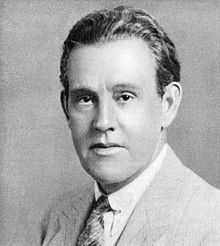Sidney Toler
| Sidney Toler | |
|---|---|

Sidney Toler in 1930
|
|
| Born |
Hooper G. Toler Jr. April 28, 1874 Warrensburg, Missouri, U.S. |
| Died | February 12, 1947 (aged 72) Beverly Hills, California, U.S. |
| Occupation |
|
| Years active | 1903–1947 |
| Spouse(s) |
|
Sidney Toler (born Hooper G. Toler Jr., April 28, 1874 – February 12, 1947) was an American actor, playwright and theatre director. The second non-Asian actor to play the role of Charlie Chan on screen, he is best remembered for his portrayal of the Chinese American detective in 22 films made between 1938 and 1946. Before becoming Chan, Toler played supporting roles in 50 motion pictures and was a highly regarded comic actor on the Broadway stage.
Hooper G. Toler Jr., who was called Sidney Toler from childhood, was born April 28, 1874, in Warrensburg, Missouri. He showed an early interest in the theater, acting in an amateur production of Tom Sawyer at the age of seven. He left the University of Kansas and became a professional actor in 1892, playing the heavy in a performance of a melodrama called The Master Man in Kansas City. In 1894 he joined the Corse Payton company and toured for four years. His success in leading roles at the Lee Avenue Academy in Brooklyn brought an invitation to join the company of Julia Marlowe. He toured with her for two years, playing the Duke of Buckingham in When Knighthood Was in Flower.
In Brooklyn, Toler played leads with the Columbia Theatre Stock Company and sang baritone with the Orpheum Theatre's operatic stock company. In 1903 he made his Broadway debut in the musical comedy, The Office Boy.
Over the next nine years Toler had his own theatre companies in Portland, Maine, and Halifax, Nova Scotia—at one point having 12 stock companies on the road. He began a prolific career as a playwright, writing The Belle of Richmond, The Dancing Master, The House on the Sands and more than 70 other plays. One particular success was a war play called The Man They Left Behind, which was presented by 67 companies in a period of three months and by 18 different companies in a single week.
...
Wikipedia
